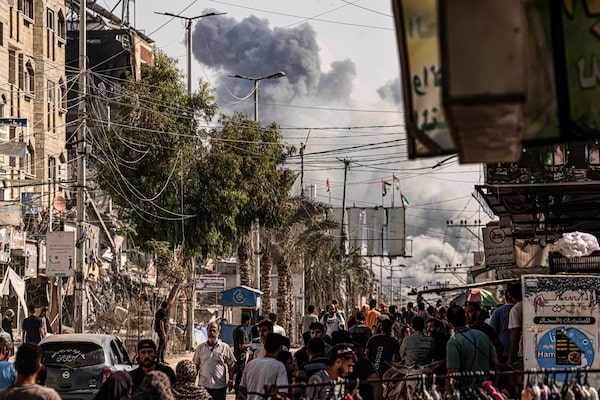Marcello Di Cintio is the author of Pay No Heed to the Rockets: Palestine in the Present Tense.

People walk along a street as a plume of smoke rises in the background during an Israeli strike on the Bureij refugee camp in the central Gaza Strip on Nov. 2.MAHMUD HAMS/AFP/Getty Images
Najlaah and Raghab had recently married when I met them in Gaza in 2015, and were expecting their first child. Both had decent jobs – a rarity in the territory – and briefly considered purchasing an apartment in Gaza City. They quickly decided against it, not wanting to spend their savings on a home that might not survive the next Israeli bombardment. In Gaza, nothing but war is certain. The current siege, for all its horrors, is less a singular event than an escalation of the cruel status quo.
My time in Gaza came almost exactly a year after Operation Protective Edge, the assault that, until now, stood as the most catastrophic attack on Gaza by Israel. Evidence of the previous summer’s conflict still remained, especially outside of Gaza City. I visited Khuza’a, where families whose homes were destroyed in the bombing still lived in temporary wooden shelters. Around them, concrete roofs sagged on the broken bodies of houses. Salvage crews had sorted the wreckage into tidy heaps of pipe, smashed cinderblock, and twisted metal the size of the pulverized homes they’d originally come from. Enormous tangles of rebar resembled the nests of something giant and demonic. I saw a freakish pile of bicycle wheels, and bullet holes spread over walls like a pox. What can be obliterated in a moment can take years to rebuild.
In the wake of the Oct. 7 terror attacks, we’ve heard stories about Israel deciding how much water, fuel, and food enters Gaza. But Israel’s control of the strip is hardly new. Israel has limited who and what passes in and out of the territory since 2007. Israel decides where fishermen fish. And Israel determines how long the lights stay on. The IDF bombed Gaza’s only electrical power station in 2006 and restricted the import of parts needed to rebuild it. Then they bombed it again in 2014. For nearly two decades, a foreign power has decided if and when Gazans could turn on their taps or switch on their lights.
Gazans have learned to cope with the fuel shortages and power cuts. In a town in southern Gaza, I watched a woman bake pita in one of the traditional wood-burning clay ovens put into greater use since the blockade began. I asked her where she got the wood. Gaza has no forests after all. She told me that Gazans fuel their ovens with the carcasses of fruit and olive trees the Israeli army bulldozed the previous year. Elsewhere, I visited a bakery that smelled more like a mechanic shop. The bakers made bread in an oven fuelled with recycled motor oil.
The Gazans I met taught me how they prepare for the inevitable assaults. Many keep bags containing money, important documents, and treasured family photos near their door in case they need to abruptly evacuate. A woman named Haneen told me how she stockpiles sacks of dried beans and chickpeas, jars of olives, and packets of pasta for when bullets and bombs keep families away from the markets. Gazans stock emergency supplies of gasoline and cooking gas, too. This time, though, the stockpiles are already gone. Haneen sent me a voice message yesterday telling me that they’re now cooking over open fires.
There is a temptation in the West to gild such strategies with words like “resilience” and “ingenuity.” All condescending pats on the head. But these are acts of desperation and survival in the face of ongoing oppression. In Gaza, resilience is an affliction, not a virtue.
A brief history of Gaza’s centuries of war
More than 3,600 Palestinian children killed in just three weeks of war, Gaza health ministry says
The affliction can be psychological. One psychologist in Gaza City told me that many children suffer from a kind of generalized mental health problem that cannot fit into any criteria or diagnostic manual. A 15-year-old Gazan alive today will have lived through five devastating Israeli military operations. Children grow aggressive, isolated and serious in the aftermath of each bombing. Officials will conduct the morbid accounting of dead and injured, but nobody counts how many children have had their childishness amputated from them.
And they know more bombs are coming. There is little post-traumatic stress in Gaza because so little time passes between traumas. There is no “post.” One of the greatest difficulties for the territory’s child psychologists is establishing a rapport and giving their young patients faith. How can a child trust a therapist – or a parent, even – who tells him he’s safe when he knows, from his nightmares, that they are lying?
There is something else I learned during my time in Gaza that weighs on me. When someone passes away, Palestinians often say to the family of the deceased “May God grant you their remaining years.” The idea is that when someone dies they leave behind unlived time as a final gift for the family members they’d parted from.
But in the last few weeks, we’ve seen entire Gazan families erased. Where do those unlived years go when nobody is left to claim them?